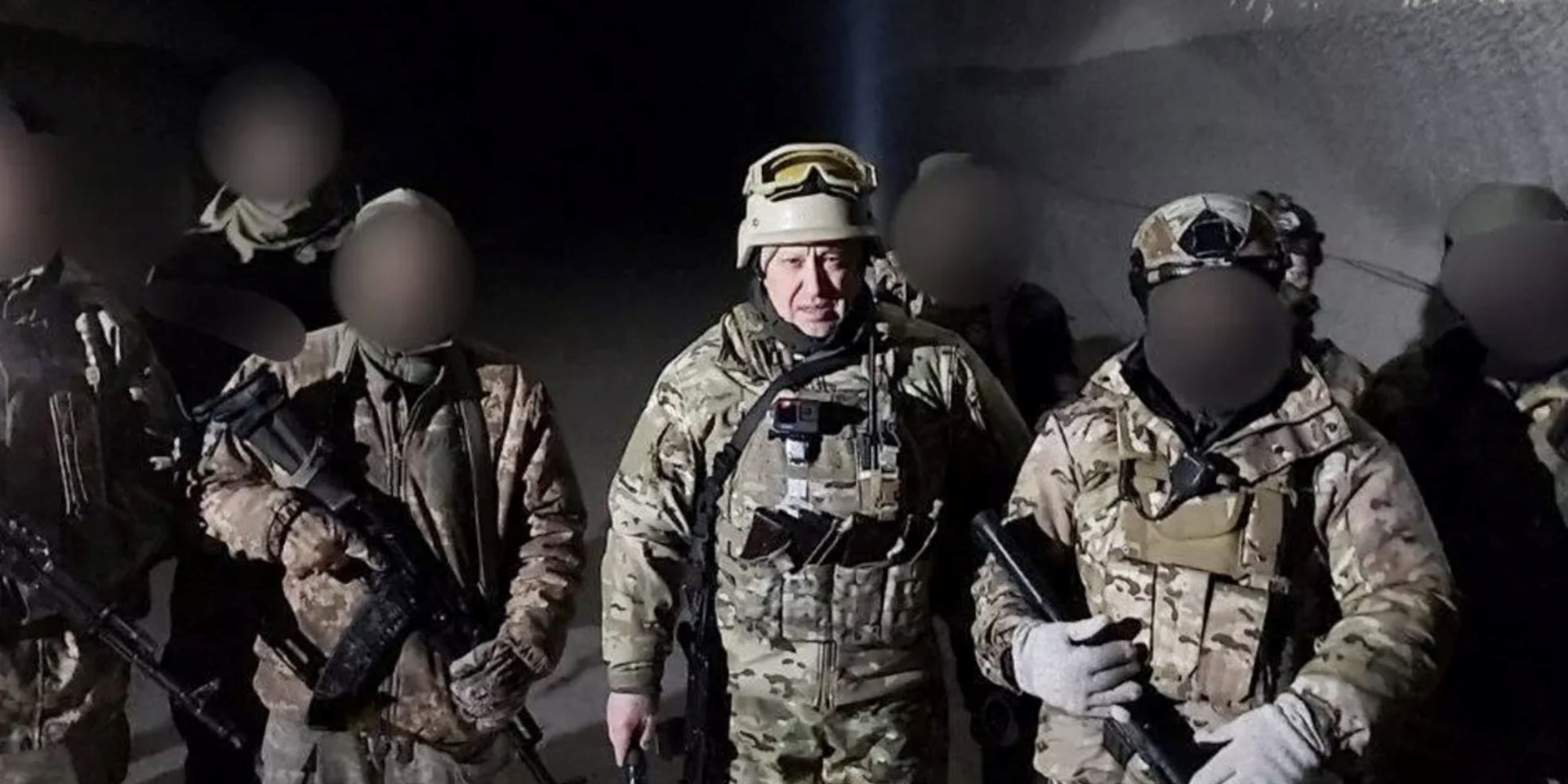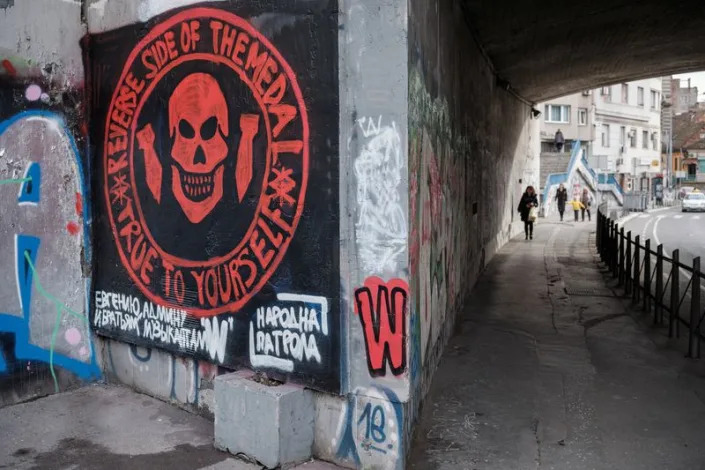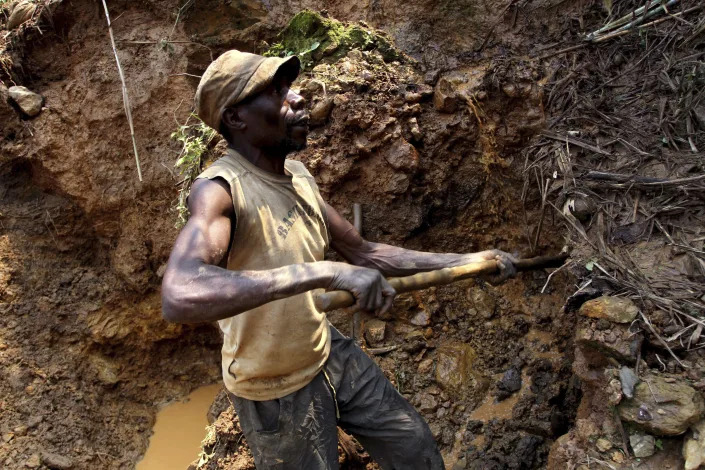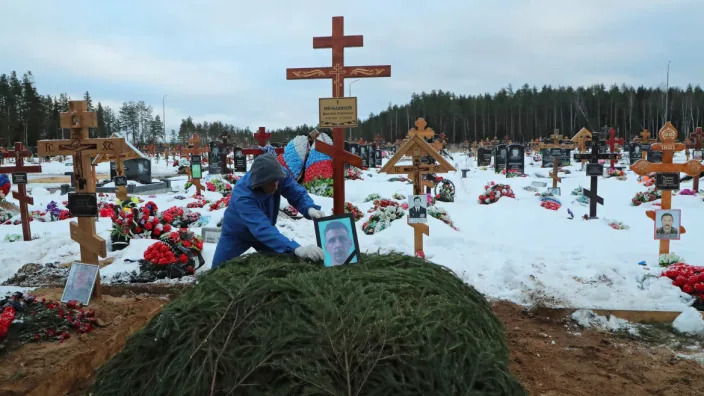Today’s guest post is by Army judge advocate LTC Alex Kostin (writing in his personal capacity). He argues for accountability for the atrocities allegedly committed in Ukraine by the Russian military company, the Wagner Group, and provides a path for doing so.
What is the Wagner Group? Last April the BBC reported on its origins and said this:
“British military intelligence says 1,000 mercenaries from the Russian private military company, the Wagner Group, are being deployed to eastern Ukraine. The group has been active over the past eight years in Ukraine, Syria and African countries, and has repeatedly been accused of war crimes and human rights abuses.”
Notably, in the U.S. view merely being a mercenary is not illegal under international law. The DoD Law of War Manual (¶ 4.21) says:
“The act of being a mercenary is not a crime in customary international law nor in any treaty to which the United States is a Party.Under the customary law of war and the GPW, “mercenaries” receive the rights, duties, and liabilities of combatant status on the same basis as other persons.”
The U.S. does recognize that there are a “number of treaty provisions [that] are intended to repress mercenary activities” but points out that the “United States has not accepted any such provision because these efforts are not consistent with fundamental principles of the law of war.” (¶ 4.21.1).
For a variety of technical and other reasons, even those States parties to treaties intended to repress mercenary activities have nevertheless had little success in prosecuting the Group for being mercenaries.
However, the focus of this post is not simply about being a “mercenary,” per se, but rather the commission of war crimes. On that score the U.S. insists:
“Mercenaries must comply with the law of war and may be tried and punished for violations of the law of war on the same basis as other persons. States that employ mercenaries are responsible for their conduct, including their compliance with the law of war.” (¶ 4.21)
LTC Kostin concludes that the Group is, de facto, an entity of the Russian state, and it is responsible for the Wagner Group’s actions.
Importantly, he further contends that the International Criminal Tribunal for the Former Yugoslavia (ICTY) case of the Prosecutor v. Tadic provides a useful blueprint as to how a prosecution might be framed, to include holding the Russian state accountable.
Lots to think about here, so take a look at his argument!
Wagner Group Atrocities – Holding Russia Accountable Under Prosecutor v. Tadic?
by LTC Alex A, Kostin, USAR, JAGC*
February 24, 2022, marked a dark page in the world’s history when Russia launched an unprovoked war against Ukraine. The international community should not let Russia get away with the gross international humanitarian law (IHL) violations committed by its Wagner mercenaries, Russia’s de facto state actors.
There is clear evidence that Russian state actors, such as the military, have violated IHL, and the recent buzz surrounding the International Criminal Court (ICC) Prosecutor’s opened investigation suggests the international community will not let these abuses go entirely unexcused (though it is relevant to note the ICC is a court of individual criminal responsibility, not state responsibility).
However, the international community must also punish the IHL violations committed by Russia’s de facto state actors, the Wagner mercenaries. Wagner, while an officially private military contractor, is, I will show below, a paramilitary group under overall Russian state control acting as a de facto unit of the Russian military.
Were an international tribunal adjudicating such atrocities to apply Tadic’s “overall control” test, it would likely succeed in holding Moscow responsible for the Wagner group’s actions.
In recent years, Wagner has committed gross IHL violations in Ukraine and worldwide.
Wagner is actively fighting in Ukraine after sending most of its foot soldiers there. To boost its Ukrainian presence, the group opened its ranks to men with criminal histories, those with unpaid debts sought by Russian law enforcement, and foreigners. While the current war in Ukraine is its latest battlefield, the group participated in Russia’s proxy wars in eastern Ukraine in 2014-15, Libya, and Syria (where it attacked American-backed forces resulting in mass casualties among the mercenaries).
The group maintains an active presence in the Central African Republic (per the 2019 investigation by Novaya Gazeta, Wagner was suspected of murdering Russian journalists who came to investigate its activities there) and other African countries. Further, Wagner’s atrocities are well documented. In 2017, an Assad army deserter was brutally murdered by Wagner members.
BBC collected at least two eyewitness’ accounts that Wagner intentionally killed prisoners in Libya in 2019. As of March of 2022, Wagner has been accused of murdering 300 civilians in Mali and scores of civilians in the Central African Republic.
Prior to the war in Ukraine, Russia was able to avoid accountability for Wagner’s atrocities.
The Russian state has consistently denied any connection to the group, and no authoritative tribunal has made a formal ruling regarding attribution. In September of 2021, Putin’s spokesperson falsely claimed Russian private military companies were providing solely “consultative and security” services.
Putin falsely claimed that private Russian military companies in Syria had nothing to do with the Russian state. These denials indicate that Russia is aware of the 1986 International Court of Justice decision, Nicaragua v. United States of America (“Nicaragua”).
Nicaragua created an exceptionally high attribution threshold. Under Nicaragua, a paramilitary unit can only be found a de facto state organ when 1) the state paid, financed, and coordinated/supervised the group’s actions, and 2) the state “specifically ‘directed or enforced’ the perpetuation” of IHL violations by the group “with respect to the specific operation in the course of which [IHL] breaches may have been committed.” Tadic at 40. In other words, under Nicaragua, the unit’s action could be attributed to the State only if it was completely dependent on the State.
After committing mass IHL violations in Ukraine, it should be harder for Russia to escape attribution.
Things changed after Putin’s army executed and tortured Ukrainian civilians en masse in the town of Bucha, leading to the investigations of Russian war crimes. Further, evidence of Wagner’s atrocities in Ukraine is becoming available – in May of 2022, the Ukrainian state charged Wagner fighters with the brutal murder of a Ukrainian village mayor and her family. The group committed the crime alongside Russian soldiers.
The Tadic attribution test should be used to hold Russia responsible for Wagner’s gross IHL violations.
If an international tribunal for prosecution of Russian war crimes in Ukraine is established to adjudicate, among other things, whether gross IHL violations committed by Wagner should be attributed to Russia, there are several reasons why Tadic should be applied to determine whether Russia should be held responsible.
Russia is not entitled to escape responsibility for the HL violations committed by its mercenaries.
a) Tadic explains that “states are not allowed on the one hand to act de facto through individuals and on the other to dissociate themselves from such conduct when these individuals breach international law.” at 48.
Attributing Wagner’s IHL violations is particularly important for this war of aggression. To avoid application of the Geneva Conventions (GC), Russia refuses to acknowledge that this war is an international armed conflict. The state claims it never invaded Ukraine, but is conducting a “special operation.” Russia has also made calling the war an invasion a domestic offense punishable by up to 15 years in prison.
The international community should not reward Russia by accepting this blatantly false characterization. As Prof. Alexander Proelss of the University of Hamburg Faculty of Law explained at the May 2022 Cushing International Law conference (which this author was privileged to attend), “the aggressor is not entitled to ‘downgrade conflict’ and thus escape the requirements of the international humanitarian law.”
b.) Under Tadic, it is easier to establish state control over an actor when the state attempts to occupy another state.
Tadic holds that a state is in overall control of an organized paramilitary group if it finances and militarily assists such a group and coordinates or helps in the general planning of the group’s military activity. Id. at 56. For the state to be held responsible, it is not necessary for it to issue specific instructions to commit IHL violations. Id. at 56, 59.
Where the state controlling the paramilitary group is a geographically adjacent state with territorial ambitions in the area where the conflict is taking place, and it is attempting to achieve its territorial enlargement through armed forces which it formally controls, it may be easier to meet the threshold for establishing control over a paramilitary group. Id. at 59-60.
c) The relationship between the Wagner group and the Russian state meets the overall control test. Under Tadic, the degree of state control needed to attribute a group’s gross IHL violations to a state may vary depending on the factual circumstances of each case. Id. at 47-48. Tadic drew a distinction between an individual (or an unorganized group of individuals) and a paramilitary group.
The threshold for establishing control over individuals is higher, because it would be necessary to show that the state issued specific instructions to each individual. Id. at 48-49. Paramilitary groups during war, on the other hand, have a structure, a chain of command, a corresponding set of rules, and outward symbols of authority.
The individuals in these groups normally do not act on their own but are subject to the authority of the group’s commander. Id. at 49. To hold a state responsible for IHL violations committed by a paramilitary group, it is sufficient to show that the group was under overall control of the state. Id. The Tadic distinction is correctly drawn. When a paramilitary group is equipped, financed and organized by the state, it is reasonable to assume the group’s commanders are controlled by that state.
Its commanders ensure its fighters act per their directions, which they receive from the controlling state. Consequently, when overall state control is shown, the state is responsible regardless of whether the state directed the specific IHL violations and even in situations when the group performs contrary to the state’s instructions. Id. at 49-50.
d) Finally, unlike Nicaragua, Tadic is grounded in international precedent. Tadic explained that the test proposed by Nicaragua is at variance with the international judicial and State precedent that held States responsible in the circumstances where a lower degree of control that that demanded by the Nicaragua test was exercised. at 51.
In support of this argument, Tadic cited multiple decisions which held countries responsible for the actions of paramilitary groups on the basis of overall control, without inquiring whether the countries specifically directed the groups to commit IHL violations. Id. at 51- 56.
To hold Russia accountable for Wagner’s gross IHL violations, a Tadic-based framework should be used.
The prosecution should establish that: a) Wagner is a currently existing Russia-authorized mercenary paramilitary group; b) the mercenaries committing gross IHL violations belong to Wagner; c) Russia financed, supplied, and provided training and/or medical treatment for Wagner; and d) Russia has overall control of Wagner – i.e. that Wagner is operating with Russian military forces with the Russian goal of occupying Ukraine and defeating Ukrainian Armed Forces (UAF)).
a) Wagner is a mercenary group authorized by Russia. Contrary to Russia’s boldfaced denials, Wagner exists. In 2021, the European Union imposed sanctions against some of its commanders. In Syria, its mercenaries attacked US-supported Syrian positions at Deir Ezzor in February of 2018. It fought as a de facto Russian army’s auxiliary unit during the Russia-sponsored war in eastern Ukraine in 2014-2015, Syria, Libya, and other African countries. The best proof that Wagner’s existence is fully authorized by Russia is, that under Russian law, the group is a criminal organization.
The Russian Constitution’s Art. 13 prohibits “existence and activities of … public organizations whose goals are …creation of paramilitary units….” So, Russian law makes recruiting, training and financing mercenaries and serving as a mercenary in combat a felony. Thus, if the Russian state followed its own law, Wagner would have been banned as a criminal organization with its members serving long felony prison terms.
Quite the opposite is happening in Russia – Wagner is openly recruiting and training in Russia (see subsection c, below) and is fighting in Ukraine and elsewhere. Considering the extreme centralization of decision-making in Russia in the hands of its strongman, the only reasonable explanation for Wagner’s thriving in Russia is that the group was created and authorized by the Russian state and Putin personally.
b) Wagner mercenaries are committing gross IHL breaches. Its members are mercenaries as defined by the GC AP Art. 47(2). They are recruited to and take part in the armed conflict. They are motivated to do so by the desire for private gain (they were paid around $5000 a month in Libya), are not parties to a conflict, are not members of the Russian armed forces, and have not been sent by a State that is a non-party to the conflict on official duty as members of its armed forces.
To establish that the mercenaries committing gross IHL breaches in Ukraine belong to Wagner, the prosecution would need to present evidence of the Wagner-identifiable items found on the fighters, their confessions, and the information they post on social networks.
Combat military medals awarded by Russia (a 2021 investigation showed its commanders were awarded Russia’s most prestigious military awards reserved for military/law enforcement), paraphernalia such as distinctive dog tags (according to the official UAF’s intelligence directorate channel, a Wagner dog tag was taken off the body of a mercenary in March of 2022), and identifiable Wagner patches could offer compelling identification of Wagner individuals.
c) Russia finances, trains, and provides army-grade weaponry and medical treatment to Wagner. To hide Wagner’s connection to the government, candidates apply for civilian jobs through shell companies and are not recruited directly. However, Wagner members are openly training at the site next to the airborne unit’s base. Its fighters were also evacuated and treated in Russian military hospitals after fighting in Syria.
It would be difficult to track down Russian state financing of Wagner, as it is financed through a string of shell companies connected to Mr. Prigozhin, a member of Putin’s inner circle. Information obtained from Wagner’s records, confessions of Wagner’s fighters, and investigation of Prigozhin’s group of companies would likely help prosecutors trace Wagner’s direct financing to Russia.
The prosecution would also need to produce evidence of Wagner’s active participation in combat and use of Russian army-grade modern military equipment/weaponry to set it apart from the military and security contactors Russia claims they are.
The internationally recognized 2008 Montreux document explains legitimate contractors can provide “armed guarding and protection of persons and objects…; maintenance and operation of weapons systems; prisoner detention; and advice to or training of local forces and security personnel.”
The Russian-army grade heavy weaponry Wagner is using in combat is by definition not used by contractors. The documented combat use of such equipment by Wagner operatives indicates it is a de facto Russian military unit. Wagner’s attack at Deir Ezzor using heavy weaponry indicates it is equipped with the weapons available solely to the Russian army.
The BBC exposé on Wagner’s activities shows it commonly requests and uses such heavy weaponry. The information BBC obtained indicated Wagner planted several types of Russian-made anti-personnel mines, and its supply order included advanced weaponry such as assault rifles, night vision goggles, compact radar systems, T-72 tanks, and 120-mm mortars.
d) Russia’s occupation of Ukraine’s territory shows it is in overall control of Wagner. The Ukrainian war made proving the second Tadic prong easier. The Russian army’s occupation in southeastern Ukraine shows that Putin’s goal is annexation of the Donbass region of Ukraine and connecting Crimea to Russia via Donbass.
To prove that Russia has “overall control”, prosecutors would need to demonstrate that Wagner participated in combat operations along with the Russian forces pursuing joint goals of defeating the UAF and occupying Ukraine’s territory. This would be prima facie evidence that the group and Russia have shared military objectives in Ukraine, and consequently that Russia has overall control of Wagner.
Conclusion
With the mounting evidence of Russia’s atrocities, the need for an international tribunal for prosecution of Russian war crimes became more urgent. Use of Tadic’s “overall control” test by such a tribunal would allow the international community to hold Putin’s regime responsible so it can no longer hide behind the back of its thugs-for-hire.
About the author
 LTC Alex Kostin, USAR, is a reserve judge advocate currently serving in the National Security Law Division, Office of the Judge Advocate General, U.S. Army, as a National Security Law attorney. On his 5th active duty tour, he previously served an Integrated Disability Evaluation System (IDES) counsel, trial counsel, and as a legal assistance/administrative law attorney, both in the U.S. and overseas. In the reserves, he served as a CJA for the IO Brigade and the Division, and in other capacities. As a civilian, he works as a post-conviction attorney representing Washington Department of Corrections in federal and state courts. He is bilingual (Russian is his native language) and that allowed him to use Russian sources for this post.
LTC Alex Kostin, USAR, is a reserve judge advocate currently serving in the National Security Law Division, Office of the Judge Advocate General, U.S. Army, as a National Security Law attorney. On his 5th active duty tour, he previously served an Integrated Disability Evaluation System (IDES) counsel, trial counsel, and as a legal assistance/administrative law attorney, both in the U.S. and overseas. In the reserves, he served as a CJA for the IO Brigade and the Division, and in other capacities. As a civilian, he works as a post-conviction attorney representing Washington Department of Corrections in federal and state courts. He is bilingual (Russian is his native language) and that allowed him to use Russian sources for this post.
Disclaimers:
*The views expressed in this article are solely those of the author and do not necessarily reflect the official policy or position of the U.S. Department of Defense, the U.S. Army, or any part of the US Government.
The views expressed by guest authors do not necessarily reflect my views or those of the Center on Law, Ethics and National Security, or Duke University. See also here.
Remember what we like to say on Lawfire®: gather the facts, examine the law, evaluate the arguments – and then decide for yourself!
 Wagner Group chief Yevgeny Prigozhin in what Russian state media described as the salt mines of Soledar, eastern Ukraine, on January 10 2022. (RIA Novosti)
Wagner Group chief Yevgeny Prigozhin in what Russian state media described as the salt mines of Soledar, eastern Ukraine, on January 10 2022. (RIA Novosti)![]()








